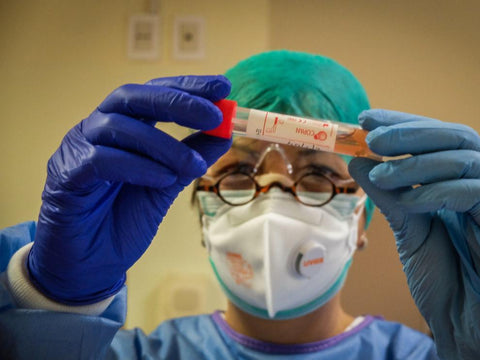Vision-Related Implications of COVID-19 can be Mitigated with Appropriate Care

New York, NY, October , 2020 — About 30 percent of those diagnosed with COVID-19 experience conjunctivitis (an eye infection), and countless others with ocular diseases that require ongoing evaluation and treatment are skipping their checkups out of fears of contracting COVID-19.
Dr. Daniel Laroche, Director of Glaucoma Services and President of Advanced Eyecare of New York, emphasizes that, while the pandemic may have changed the way we visit our doctors, it’s imperative that we stay up-to-date with our vision exams, particularly for those with conditions such as glaucoma and diabetic retinopathy that could lead to blindness if left unchecked. He suggests that those in high-risk categories should add eye protection to their regimen of wearing masks and frequent hand washing when visiting public places.
“During the coronavirus pandemic, people should guard their eyes with glasses or face shields to protect their eyes from virus infection," Dr. Laroche says. People also need to know, even though there are many concerns about COVID-19, common-sense precautions can significantly reduce the risk of infection, he says, adding: “Wash hands frequently, follow good contact lens hygiene and avoid rubbing or touching our mouth, nose and especially our eyes.'' Dr. Laroche is also affiliated with the New York Eye and Ear Infirmary of Mount Sinai, Island Eye Surgical Center and New York University.
The COVID-19 pandemic has also changed the way people visit their doctors. For patients over 60, Dr. Laroche advises it's better to stay home and do telehealth over the phone or video consultation until the pandemic flattens. He also encourages people to wear face masks on visits and maintain social distancing, even if they are in a health clinic.
“Eyesight or human vision is one of the most important senses. As much as 80 percent of what we feel comes through our sense of sight. By protecting the eyes, people will reduce the chance of blindness and vision loss while also staying on top of any developing eye diseases, such as glaucoma and cataracts. A healthy brain function requires a healthy vision. The brain is our most essential organ, and it allows us to control other organs. Normal and healthy vision contributes to improved learning and comprehension for a better quality of life,” says Dr. Laroche.
Dr. Laroche says there is another critical issue that COVID-19 has brought to the forefront and that is the issue of health care disparities among Black and Brown people. “Nationally, African American deaths from COVID-19 are nearly two times greater than would be expected based on their share of the population. In four states, the rate is three or more times greater. In 42 states, plus Washington, D.C., Hispanics make up a greater share of confirmed cases than their share of the population. In eight states it’s more than four times greater,” he says, adding: “In stark contrast, white deaths from COVID-19 are lower than their share of the population in 37 states.”
Dr. Laroche says there are several things that can be done to not only address but to help combat this issue:
- Increase the number of Black and Afro-Latino physicians worldwide.
- Implement universal health care.
- Increase wealth and education which produces better health.
- Provide a living income stipend for poor people to access food and reduce malnutrition.
- Eliminate racism to reduce stress.
- Identify white supremacist organizations as terrorist groups.
- Recommend all corporations have people of color in the top management and leadership positions.
- Eliminate sole reliance on standardized testing as the criteria to be used at entry to magnet schools.
- Provide more funding to reduce homelessness and for mental health.
- The government should also require medical school, research and hospital funding to diversify and benefit people of color.
About Dr. Daniel Laroche
Dr. Laroche is an exceptional glaucoma specialist in New York. He studied and received his bachelor's degree from New York University and a medical doctorate with honors in research from Weil Cornell University Medical College. He underwent a medical internship at Montefiore Hospital and finished his ophthalmology residency at Howard University Hospital in Washington D.C., where he was the chief resident in his third year. He later completed his glaucoma fellowship at New York Eye and Ear.
For more information about Dr. Laroche, please call 212-663-0473 or visit: www.advancedeyecareny.com.
